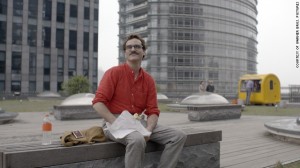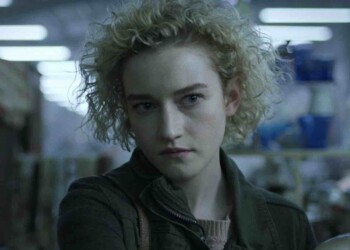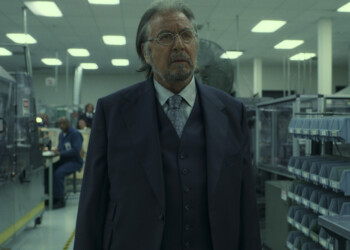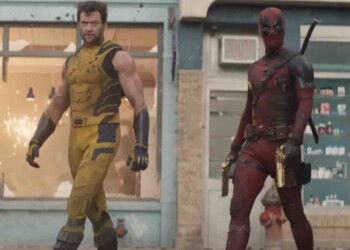The new movie ‘Her’ pushes us into the not too distant future but shows a world where all we want is to find some connection, any connection and find someone to love…
By Patrick Guera — Staff Writer/Featured Reviewer
I’m an admitted movie addict. I see far more movies than I review for Nerdcore Movement, mainly because I feel that most of the films put out, especially the indie flicks and dramas I frequent, tend not to speak to Geek Culture. When I shuffled into the theater to watch Spike Jonze’s (Being John Malkovich, Where the Wild things Are) latest outing, Her, it seemed as if this would be another movie that wouldn’t be applicable to the fine format that is Nerdcore Movement. The usual art house crowd: the over 40 set and hipsters, dotted the theater. Not an overtly nerdy person in sight. When the lights dropped and the film began, it was clear from the outset that Her had so much more to offer than a dreamy, alt-rock soundtrack and a mustachioed anti-hero. While Her does stroll through lens-flared melancholy and quirky characters, its playful sci-fi backdrop speaks to a much larger truth- one that geeks and nerds have felt since long before the internet, social media and smart phones- the pain of isolation and desperation to connect and understand what it means to be loved. Her also examines what the culture of technology is doing to our ability to create lasting human connections. Geeks be warned, Her puts a mirror up to our culture of avatars and online second-lives and we may not like what we see, but we need to confront it nonetheless.
Her stars Joaquin Phoenix (Walk the Line, Signs) as Theodore, a man who writes love letters in the not-too-distant future. The irony of Theodore’s existence is that for all the eloquent soliloquies he writes for other people, he is slowly withering from a crushing divorce that even after a year of separation, he is not ready to accept. He stumbles through the dating scene; unable to find someone that can match the magic of the marriage that haunts his memories. Enter Samantha, the new operating system that organizes Theodore’s life, played by the voice of Scarlett Johansson (The Avengers, Lost in Translation). Her uncanny ability to speak to Theodore on a human level- quizzically learning about life and love through him- sparks a truly genuine romance.
Initially, this romance seems absurd: a man in love with the disembodied voice of his operating system is something out of a bad political talk show debate. But Jonze (who makes his screenwriting debut with this film) captures a whirlwind love affair brilliantly. From the initial sexual fire to the inevitable clash of ideology, both Pheonix and Johansson put on heartfelt performances that are truly indicative of a two star-crossed lovers from different worlds. Their passion for each other is ultimately undone by insecurity and the need to find an identity in a world moving faster than they can keep up with. In one particularly awkward scene Samantha tries to create a physical connection with Theodore that goes horribly wrong. The scene perfectly encapsulates the vulnerability we expose ourselves to in an attempt to find a connection with those we love. Only the best films of the year were able to capture the fragility of being in love, Her undoubtedly tops that list.
Johansson in particular gets high marks for her portrayal as the disembodied voice of Samantha. Through words alone, she conveys the emotions of a highly intelligent young woman posited into a world that doesn’t quite understand her- a position many geeks and nerds know all too well. The character of Samantha is a reflection of what it means to be vastly different and misunderstood, but still she desperately looks for something that will make her more human. Samantha soon finds that acceptance amongst a group of other Artificially Intelligent beings, something that creates a great rift between her and the human man she loves.
Phoenix’s turn as Theodore strikes an even deeper chord in the current culture of technology-based relationships. Ever more withdrawn from life, Theodore finds solace in Samantha, but at the price of disconnection from his deeper issues. Without getting too psychological, I saw this character as a stark reflection of the online life people tend to lead these days. Some people become so defined by their online personality that they begin to escape the harsher reality of real life, and lose themselves to the glow of their screens. Theodore too falls prey to the instant gratification that Samantha provides. After very brief, failed attempts at connecting with other human beings, Theodore falls hopelessly for someone he can never truly be with as they live a life “connected” but ultimately, not sustainable. His human flaws reemerge- even in his artificially intelligent romance- because he hasn’t bothered to address them in the real world first.
For his effort, director Spike Jonze should receive heaps of praise. Gone is his signature whimsical universe of oddly shaped characters. But his ability to convey the perspective of isolated, fragile and introverted individuals remains painstakingly accurate. The world around our troubled characters is muted and distant, yet the utter joy exuded in bursts keeps the mood palatable without compromising the message. This film insists you can be happy, but it takes real work, and real connection. Her is stripped down to a very human level, filled with relatable and flawed people. And the sci-fi aspect of the film is boiled down to accurately address the issues usually hidden in overly-complicated tech. Music video and commercials director Joseph Kahn put it best in is review:
“Science fiction is a natural fit for Spike Jonze’s transposition in that he makes implausible things plausible…In the case of HER, the science fiction genre easily allows us to believe in an artificial intelligence you can fall ironically in love with.”
Ultimately, what I want my beloved geeks and nerds who spend the majority of their lives in front of a computer screen to take away from a film like Her; is that there is a connection out their for all of us, it can be had, but we must first interact with the world beyond the cyber universe, if only to understand what it means to be human and ultimately share that with someone else, who is likely feeling a little alone and out of place. Theodore’s journey ultimately leads him to the realization that it takes reaching out to your fellow human to see them for their flaws and not just their perfect, binary alter ego.
In a very crowded Oscar season we have films like The Wolf of Wall Street and 12 Years a Slave that give us a glimpse into our deplorable pasts, begging us not to repeat our mistakes. Her offers us a glimpse into our possible future and asks us make the changes necessary now to grow together as the human race and build connections deeper than the vast, anonymous worlds that technology can provide. The technology we create doesn’t have to define us, but used wisely, it can teach us to be better people.






